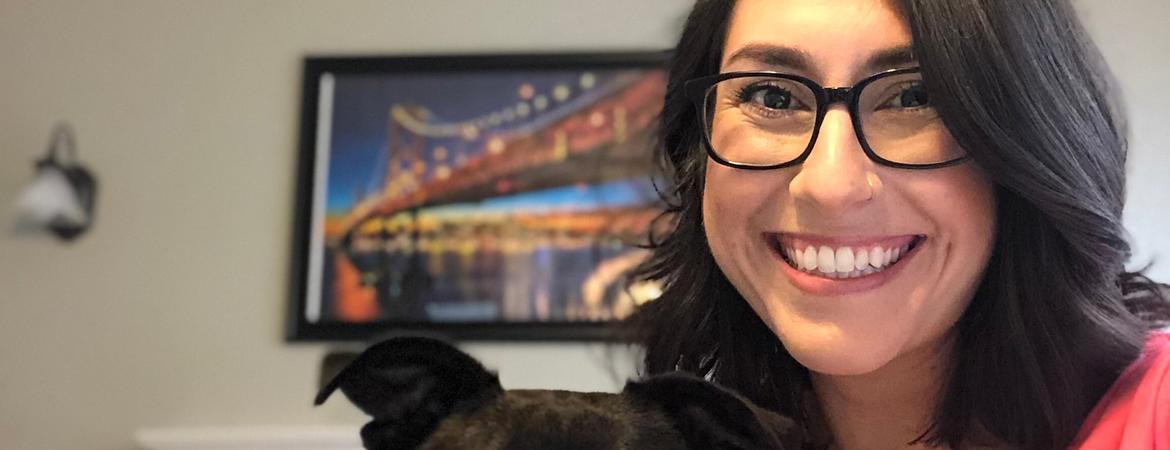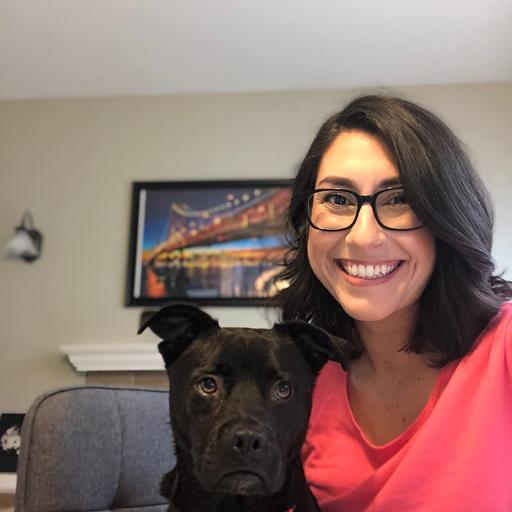
Danielle Cravalho is a fourth-year in the school psychology doctoral program. We interviewed her about the importance of peer support groups especially during COVID-19, and how she’s destressing (hint: it’s furry and has four legs!).
Where are you sheltering in place? I’m located in Riverside during shelter in place, but now that school, practicum, and research has transitioned to all online, I’m getting ready to move back to Northern California with my family.
What has been the most challenging, or biggest change, to your daily life, or life as a grad student, over the past few weeks? The past few weeks have tested my ability to maintain work-life balance. It’s difficult to stay focused on schoolwork in the same environment that I like to rest and relax. I’ve had to make distinct areas in my house for the different activities in my day.
You started two peer support groups at UCR. Can you talk a little about these groups, and why they are important? With the support of other students, staff, faculty, and community members, we started R’ Collegiate Recovery meetings and R’ Grad Peer Support group meetings. Both group meetings focus on improving our health and wellness. These groups are important to me, personally, as I strive to reach my full potential but also important to me as an advocate for mental health and recovery resources for all students and individuals. A part of that means making these resources as easily accessible as possible.
With the coronavirus impacting many aspects of our lives, we have shifted to virtual meetings on zoom. Virtual meetings present a challenge, as well, as students are faced with sitting in front of their computer all day. It may be draining to sit through an additional meeting after a long day of schoolwork. Similarly, students are forced to tap into new coping skills and activities to relieve stress and increase productivity. On the bright side, there has been an influx of resources to inform ourselves.
For those in recovery, the Association of Recovery in Higher Education has done their best to support those who have a history of a problematic substance use and are working to maintain a life of sobriety. They created new student group chats, lists of open access national and collegiate recovery meetings, social events such as a virtual music festival, and webinars for staff support. Similarly, UCR’s Healthy Campus is offering a webinar series “to provide us with information, tools, and resources, as we transition into this new way of life.” These resources help inform how we support each other in our recovery and grad student peer support group meetings.

Do you have any tips for students or peers who may be struggling during this unprecedented time? Although we might be experiencing “resource overload” with the numerous zoom meetings and webinars available, I strongly encourage students and my peers to utilize the resources available. It’s okay to feel stressed, overwhelmed, or unproductive. We are experiencing a pandemic, but we can support one another as best as possible through the various virtual meetings, group chats, and webinars to get through this time.
What makes you successful/or helps you de-stress during this time? Well…I adopted a dog! Owning a dog has helped me maintain a schedule and engage in new activities such as going for runs while maintaining social distancing. I don’t have roommates so having a dog here with me has definitely helped me de-stress and has provided me comfort.
Anything else you’d like to add? To whoever is reading this, you are not alone. We are all in this together and never hesitate to reach out to friends, peer support groups, colleagues, professional health providers, etc. when needed.
Resources and links to student support groups:
UCR R'Collegiate Recovery
Meetings are every Monday at 3pm and Tuesday at 2pm
UCR R'Grad Peer Support
Meetings are every Thursday at 6pm
Virtual Collegiate Recovery Resources: ARHE
UCR Healthy Campus webinar series